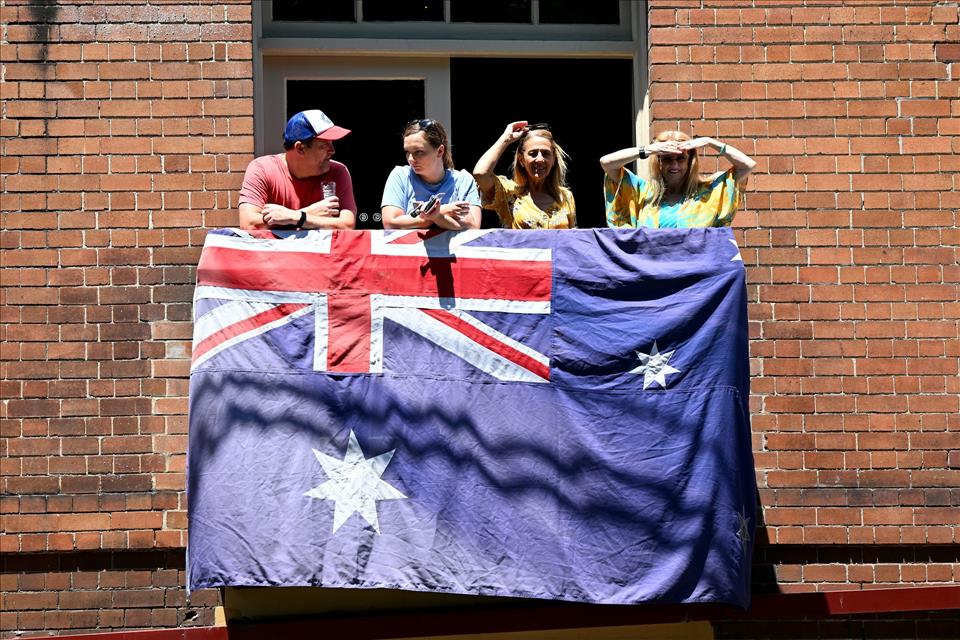
Support For Changing Date Of Australia Day Softens, But Remains Strong Among Young People: New Research
Some local councils, such as Geelong in Victoria , are reversing recent policy and embracing January 26 as a day to celebrate with nationalistic zeal. They are likely emboldened by what they perceive as an ideological shift occurring more generally in Australia and around the world.
But what of young people? Are young Australians really becoming more conservative and nationalistic, as some are claiming? For example, the Institute for Public Affairs states that“despite relentless indoctrination taking place at schools and universities”, their recent survey showed a 10% increase in the proportion of 18-24 year olds who wanted to celebrate Australia Day.
However, the best evidence suggests that claims of a shift towards conservatism among young people are unsupported.
The statement“we should not celebrate Australia Day on January 26” was featured in the Deakin Contemporary History Survey in 2021, 2023, and 2024. Respondents were asked to indicate their agreement level. The Deakin survey is a repeated cross-sectional study conducted using the Life in Australia panel , managed by the Social Research Centre. This is a nationally representative online probability panel with more than 2,000 respondents for each Deakin survey. With its large number of participants, weighting and probability selection, the Life in Australia panel is arguably Australia's most reliable and robust social survey.
The Deakin Contemporary History Survey consists of several questions about the role of history in contemporary society, hence our interest in whether or how Australians might want to celebrate a national day.
Since 1938, when Aboriginal leaders first declared January 26 a“Day of Mourning”, attitudes to this day have reflected how people in Australia see the nation's history, particularly about the historical and contemporary dispossession and oppression of Aboriginal and Torres Strait Islander people.
In 2023 , we found support for Australia Day on January 26 declined slightly from 2021, and wondered if a more significant change in community sentiment was afoot. With the addition of the 2024 data, we find that public opinion is solidifying – less a volatile“culture war” and more a set of established positions. Here is what we found:
This figure shows that agreement (combining“strongly agree” and“agree”) with not celebrating Australia Day on January 26 slightly increased in 2023, but returned to the earlier level a year later.
Likewise, disagreement with the statement (again, combining“strongly disagree” and“disagree”) slightly dipped in 2023, but in 2024 returned to levels observed in 2021.“Don't know” and“refused” responses have consistently remained below 3% across all three years. Almost every Australian has a position on when we should celebrate Australia Day, if at all.
The 2023 dip might reflect a slight shift in public opinion or be due to statistical factors, such as sampling variability. Either way, public sentiment on this issue seems established. As Gunai/Kurnai, Gunditjmara, Wiradjuri and Yorta Yorta writer Nayuka Gorrie and Amangu Yamatji woman Associate Professor Crystal McKinnon have written , the decline in support for Australia Day is the result of decades of activism by Indigenous people.
Though conservative voices have become louder since the failure of the Voice Referendum in 2023, more than 40% of the population now believes Australia Day should not be celebrated on January 26.
In addition, the claim of a significant swing towards Australia Day among younger Australians is unsupported. In 2024, as in earlier iterations of our survey, we found younger Australians (18–34) were more likely to agree that Australia Day should not be celebrated on January 26. More than half of respondents in that age group (53%) supported that change, compared to 39% of 35–54-year-olds, 33% of 55–74-year-olds, and 29% of those aged 75 and older.
Conversely, disagreement increases with age. We found 69% of those aged 75 and older disagreed, followed by 66% of 55–74-year-olds, 59% of 35–54-year-olds, and 43% of 18–34-year-olds. These trends suggest a steady shift, indicating that an overall majority may favour change within the next two decades.
What might become of Australia Day? We asked those who thought we should not celebrate Australia Day on January 26 what alternative they preferred the most.
Among those who do not want to celebrate Australia Day on January 26, 36% prefer replacing it with a new national day on a different date, while 32% favour keeping the name but moving it to a different date. A further 13% support keeping January 26 but renaming it to reflect diverse history, and 8% advocate abolishing any national day entirely. Another 10% didn't want these options, and less than 1% were unsure.
If the big picture suggests a lack of clarity – with nearly 58 % of the population wanting to keep Australia Day as it is, but 53 % of younger Australians supporting change – then the task of finding possible alternatives to the status quo seems even more clouded.
Gorrie and McKinnon point to the bigger issues at stake for Indigenous people: treaties, land back, deaths in custody, climate justice, reparations and the state removal of Aboriginal children. Yet, as our research continues to show, there are few without opinions on this question, and we should not expect it to recede as an issue the animates Australians.

Legal Disclaimer:
MENAFN provides the
information “as is” without warranty of any kind. We do not accept
any responsibility or liability for the accuracy, content, images,
videos, licenses, completeness, legality, or reliability of the information
contained in this article. If you have any complaints or copyright
issues related to this article, kindly contact the provider above.

















Comments
No comment